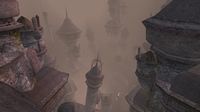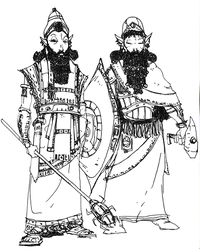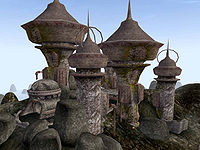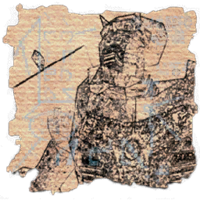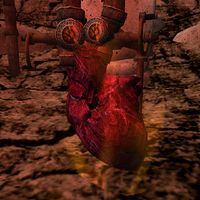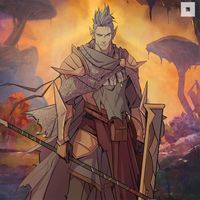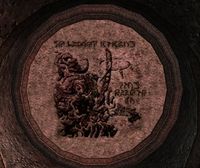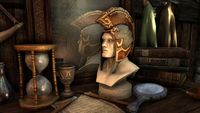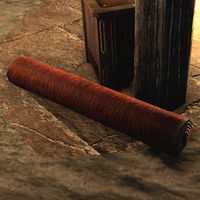Lore:Dumac
| King Dumac | |||
|---|---|---|---|
| Race | Dwemer | Gender | Male |
| Died | 1E 700 Red Mountain |
||
| Resided in | Vvardenfell | ||
Dumac Dwarfking, also known as Dumac Dwarf-Orc,[1] King of Red Mountain,[2] and Dumalacath,[3] was the last ruler of the Dwemer before their disappearance.[2] Along with Indoril Nerevar, he united the Chimer and Dwemer clans, and together they pushed the Nords out of Morrowind by 1E 416.[4] Resdayn flourished under the leadership of Dumac and Nerevar, and the two developed a mutual respect and friendship.[5][6] Peace among the Chimer, and between them and the Dwemer, brought an unprecedented prosperity and flowering of both cultures.[6]
Contents
History[edit]
The First Council[edit]
Since the Nordic invasion and conquest of present-day Morrowind by King Vrage around 1E 240,[7] the Nords had ruled the region. At the turn of the second century of suppression, Dumac Dwarfking's Dwemer and Indoril Nerevar's united Velothi Chimer forged an alliance against the common foe.[8] The alliance ultimately succeeded in driving the invaders from the land in 1E 416, leading to the First Council of newly-named Resdayn. Indoril Nerevar and Dumac Dwarfking were elected as leaders of the First Council.[UOL 1] Nerevar became the Hortator of the Great Houses of the Chimer and Dumac became the King of the great Second Empire freeholds of the Dwemer.[9][10]
Nerevar had three councilors known as Vivec, Almalexia, and Sotha Sil whereas Dumac had his High Priest and Chief Tonal Architect Kagrenac at his right hand. Serving as a trusted friend of both rulers was Voryn Dagoth the Lord High Councilor of House Dagoth. Nerevar's Tribunal of councilors advised caution in the alliance with the Dwemer but Nerevar had great trust and love for his friend forged from the bonds of war. Dumac faced his own dissension with the Rourken Clan rejecting the union and leaving Resdayn for modern day Hammerfell as a result.[11] The Kragen clan would follow Rourken's lead and depart for Skyrim.[12]
Despite these setbacks the two rulers had created a time of peace.[6] Dumac is said to have given the swords Hopesfire and Trueflame to Almalexia and Nerevar as wedding presents.[13] Dumac gifted Sotha Sil a wing of Kemel-Ze as a sign of the alliance between their two peoples.[14] Sotha Sil used this facility to do preliminary work on his lifelong project, the Clockwork City.[15] Dumac and Nerevar attended the coronation of Emperor Gorieus in 1E 461 as representatives of Resdayn and despite the hatred for all elven kind by the Alessian Order, and presence from other former enemies such as Hoag Merkiller, the event was peaceful speaking to the diplomatic nature of the two rulers.[16]
War of the First Council[edit]
After over three centuries of peace and unity between the Dwemer and Chimer, things would take a turn resulting in the War of the First Council that would conclude at the fabled Battle of Red Mountain. Various sources differ on what started the conflict and what events took place, with Dumac having key roles in each narrative.
Kagrenac's Folly[edit]
Certain stories, namely that of both the Ashlanders and Vivec tell a similar tale that differ in key aspects, the theme of these stories paint a picture of Kagrenac keeping information from Dumac that leads to a misunderstanding between Nerevar and Dumac that leads to war.
These accounts involve Lord Dagoth approaching Nerevar and his advisors, Almalexia, Sotha Sil, and Vivec with knowledge that House Dagoth had discovered the source of the long unknown secret power source the Dwemer worshipped, that of the legendary Heart of Lorkhan. Dagoth explained that the Dwemer had used this profane power to make themselves immortal and thus beyond the measure of the gods, and that the High Priest, and Chief Tonal Architect of the Dwemer Kagrenac the Blighter even had gone as far as to devise tools to build a New God that served as a mockery of Chimer faith and a fearsome weapon that the Dwemer would use to claim Resdayn for their own.[6][2]
Nerevar was troubled by this and approached Dumac with these accusations and asked if they were true. Kagrenac and his priests had kept the construction of the New God, Numidium, a secret from the king and thus Dumac claimed innocence for his people of any wrongdoing. Kagrenac approached Nerevar and asked him who he thought he was to presume to judge the actions of the Dwemer. Nerevar was no less troubled by this meeting with the Dwemer, so now made pilgrimage to Holamayan, the sacred temple of the Daedric Prince Azura, who confirmed that everything Dagoth had said was true, and that the construction of this New God should be prevented at all cost for not only the sake of Resdayn, but for the whole world.[6][2]
Nerevar, angered that Dumac seemingly lied to him, returned to Red Mountain one final time arrayed in arms and armor and surrounded by his hosts, he hoped to preserve the peace, but demanded to Dumac and his people that they give up their worship of the Heart of Lorkhan. Dumac was still unaware of the plans of the New God, but was proud and protective of his people and the two quarreled bitterly and thus went to war.[6][2]
The War of the First Council concluded at the Battle of Red Mountain. According to the aforementioned accounts, by the combined cleverness of the Tribunal and Nerevar, the Dwemer armies were largely drawn out of their fortress of Red Mountain into the open fields, which allowed Nerevar, Dagoth, and a small group of companions the opportunity to sneak into the Heart Chamber by secret means. There, the two kings Nerevar and Dumac met and both fell from grievous wounds and draining magics.[6][2] The similar accounts disagree on exactly what happen next at this point.
Vivec's retelling says that with his king down, and threatened by Voryn Dagoth and others, Kagrenac turned his tools upon the Heart, and at that moment all Dwemer in the world disappeared without a trace.[6]
Betrayed Kings[edit]
Other accounts of the War of the First Council and ultimate conclusion at the Battle of Red Mountain go in a much different direction in regards to Dumac. Whereas the aforementioned accounts have him reaching conflict with Nerevar and the two leading opposing sides of the war, some say otherwise. These accounts go as far to state Dumac and Nerevar stayed loyal to one another till the end, with certain Chimer and Dwemer in their ranks betraying them and aligning with westerners.
According to the Nordic legends of the Five Songs of King Wulfharth the Nords upon learning that the Dwarves and Devils (Chimer) of the eastern kingdoms had started to fight again, the Nords hoped they might be able to reclaim their ancient holdings because of it. They made plans for attack but quickly gave up after realizing they had no strong King to lead them. But suddenly Voryn Dagoth, who the Nords referred to as the Devil of Dagoth arrived swearing peace, and claiming he knew where the Heart of Shor was. Dagoth informed the Nords that the Devils and Dwarves had the heart of Shor but the Nords grew suspicious asking why he would betray his countrymer in such a manner to which the Devil of Dagoth responded that his people have betrayed one another since the beginning of time, and this was so and so the Nords believed him.[17]
The Tongues sung Shor's ghost again and Shor gathered an army as he did of old, and then he sucked in the long-strewn ashes of King Wulfharth and remade him, for he needed a good general. But the Devil of Dagoth petitioned to be that general too, and pointed out his role as the blessed harbinger of the holy war, thus Shor had two generals, the Ash King Wulfharth and the Devil of Dagoth. And they marched on to the eastern kingdoms with all the sons of Skyrim.[17]
The next song of King Wulfharth claims that the Devil of Dagoth had tricked the Nords, the Heart of Shor was not in the eastern kingdoms and never had been, as soon as Shor and his army arrived to Red Mountain, the Devils and Dwarves fell upon them. Their sorcerers lifted the mountain and threw it onto Shor, trapping him under Red Mountain for all of time. The Nord army was slaughtered but not before Wulfharth managed to kill Dumalacath the Dwark king and doom his people. Vehk the Devil then blasted the Ash King into Hell but Kyne lifted him from Hell and showed the color of blood when it is brought by betrayal, and the Nords vowed to never trust another Devil again.[17]
A subsequent secret song titled "The Truth at Red Mountain" claims that the Heart of Shor was indeed in Resdayn as Dagoth Ur had promised. Dagoth Ur admitted that the Tribunal had betrayed Nerevar's trust and had sent him to Lorkhan (for that is what they called Shor in Resdayn) so that the god might wreak vengeance on the Dwemer for their hubris, as they believed Nerevar's peace with the Dwemer would bring ruin to the Velothi way. Lorkhan vowed that for his own reasons the Dwemer would indeed die by his hand.[17]
Lorkhan claimed Nerevar the son of Boethiah, one of the strongest Padomaics and recognized him as a hero to his people despite his treacherous Tribunal and said he would muster enough that the battle ahead would be hard going. And so Dagoth-Ur, who wanted the Dwemer as dead as the Tribunal did, went to Kogoran and summoned his House chap'thil, his nix-hounds his wizards, archers, his stolen men of brass. And the Ash King Wulfharth went and made peace with the Orcs in spite of his Nordic blood, and they brought many warriors but no wizards at all.[17]
At the last Battle of Red Mountain, Lorkhan, Dagoth Ur, and Wulfharth confronted Nerevar who wielded Keening, Dumac who wielded Sunder and Alandro Sul the immortal son of Azura who wielded the Wraith Mail. Lorkhan had reunited with his Heart, but he had long been from it and needed time to gain his full strength. Wulfharth and Sul dueled but Wulfharth was unable to strike him, he fell from grievous wounds but not before shouting Sul blind. Dumac was able to strike Lorkhan's Heart with Sunder but was subsequently slain by Dagoth Ur. Nerevar turned away from Lorkhan and struck down Dagoth Ur in a rage but was then left open to receive a mortal wound from Lorkhan. But Nerevar feigned the death that was coming early and struck Lorkhan with surprise on his side. The Heart had been made solid by Dumac's earlier tuning blow with Sunder and because of this Nerevar was able to cut it out with Keening, dealing Lorkhan a second death and the whole thing was thought over.[17]
The Secular Houses[edit]
These accounts paint a much more hostile picture between Nerevar's Chimer and Dumac's Dwemer in comparison to the aforementioned accounts that attribute their conflict to misunderstanding or even claim they didn’t conflict at all. These accounts speak to fundamental religious and cultural differences between the two peoples that ultimately led to resentment and war.
As the story goes, religious disputes were formed between the secular Great Houses of the First Council, House Dwemer and House Dagoth and the orthodox Houses Indoril, Dres, Hlaalu, Telvanni, and Redoran.[18][19][20] The basis of the disputes was about the sorceries and enchantments practiced by the Dwemer and declared profane by the other houses.[19] The alliance with House Dagoth came naturally as by some accounts House Dagoth had taken to practicing some of the rituals and principles pioneered by High Craftlord Kagrenac, with Dagoth Ur himself adopting the views and motivations of Kagrenac.[21] They also found themselves aligned with western allies in the Nords and Orcs who were drawn in from the promises of land and booty.[19][18]
House Dagoth, House Dwemer and the others held northwest Resdayn and delivered the widely dispersed and poorly organized Orthodox Houses defeat after defeat until Nerevar was made undisputed general of all House troops and levies.[20] Nerevar also secured aid of the nomadic Ashlanders who proved to be vital as scouts in a major battle on Vvardenfell in which the Secular forces were outmaneuvered and defeated and the survivors were forced to flee to Dwemer stronghold of Red Mountain.[20][19]
After a brief siege, an act of treachery allowed Nerevar and his troops to enter the fortress.[19] The Secular were defeated with great slaughter. Dumac and Nerevar met in battle with Nerevar killing him, and subsequently feasting on his old friend's heart.[22][23] Dagoth Ur managed to deal a mortal wound to Nerevar,[24] but thereafter terrible sorceries were used that resulted in the utter extermination of the Dwemer, House Dagoth, and their allies.[20]
Sermons[edit]
Vivec has alternative accounting of the battle in his Sermons. This account makes similar claims to the Secular House stories that speak to Dumac's Dwemer aligning with Dagoth Ur and western allies.
He claims that the Dwemer and Chimer lived under the wise and benevolent rule of Almsivi and their champion the Hortator but the Dwemer became foolish and challenged their masters. The Nords and Ysmir Wulfharth came to the aid of the Dwemer, who were led by King Dumac and High Priest Kagrenac. Nerevar led the Chimer armies and, wielding the Ethos Knife, slew Dumac at Red Mountain and saw the heart bone for the first time. Meanwhile, the Mourning Hold was attacked by Dwarven Centurions and Dwemeri tonal architects, before being repelled by Almalexia and Sotha Sil.[1] Nerevar ventured deeper into Red Mountain in search of the Sharmat, Dagoth Ur but "went too far inside" and the mountain erupted. It was then that Dwemeri high priest Kagrenac "the Blighter" unveiled the ultimate Dwemer weapon: a "walking star", which immolated the Chimer armies and blasted the land with such force that the Inner Sea was created. It took the combined might of the Almsivi but they eventually destroyed the construct; as it died the Dwemer vanished.[1]
Khajiiti Tale[edit]
The Khajiit have their own tale of the events of the battle which feature a confrontation between Dumac and Wulfharth.
According to this tale, the roar of Alkosh was heard by the Khajiit who raced to him and devoted themselves to him as his greatest warriors forming the Pride of Alkosh. Lorkhaj (Shor in the Nordic) was jealous of their devotion to Alkosh and thus gave his roar to Ra'Wulfharth to spite them. Ra'Wulfharth had some level of respect for the Khajiit warriors and so instead of putting them to death, used his mighty roar to speak to Masser and Secunda, to move their fullness in the sky, changing all of the warriors to Senche however Lorkhaj then stripped them of all reason.
When Ra'Wulfharth set his sights back towards Red Mountain, he called upon all of his people to aid him, and a Senche known as Dro'Zira was the only among the “Rhojiit” who still remembered and thus was the only one to answer the summons. Ra'Wulfharth rode upon Dro'Zira at the battle who pounced upon Dumalacath Dwarf-Orc when he had his blade to the throat of the Ash King so he couldn’t roar. Following the battle Lorkhaj returned Dro'Zira from the lands of Sheggorath for saving Ra’Wulfharth.[3]
Legacy[edit]
Despite all the varying accounts all sources generally agree that following the events of the Battle of Red Mountain Dumac and all of his people, even the Dwemer in other provinces had vanished, Nerevar perished during or shortly after the battle, and Resdayn, which would come to be known as Morrowind, was now under unchallenged rule by Nerevar's Tribunal of councilors who would use Kagrenac's Tools to ascend to godhood and became known as the Almsivi.
Dumac was remembered as a demonized figure in elven culture, with many Dunmer using the exclamation "Dumac take it/you",[25] and even some Bosmer using the same phrase.[26][27] Other scholars remembered him as a legendary figure of greatness.[28]
Gallery[edit]
References[edit]
- ^ a b c 36 Lessons of Vivec, Sermon 36 — Vivec
- ^ a b c d e f Nerevar at Red Mountain — the Tribunal Temple
- ^ a b The Tale of Dro'Zira — Sonia Vette
- ^ Pocket Guide to the Empire, 1st Edition: Morrowind — Imperial Geographical Society, 2E 864
- ^ The Seven Curses — Gilvas Barelo
- ^ a b c d e f g h The Battle of Red Mountain — Vivec
- ^ Pocket Guide to the Empire, 1st Edition: Skyrim — Imperial Geographical Society, 2E 864
- ^ Pocket Guide to the Empire, 3rd Edition: All the Eras of Man, A Comprehensive History of our History — Imperial Geographical Society, 3E 432
- ^ Guylaine's Architecture — Guylaine Marilie
- ^ Yagrum Bagarn's dialogue in Morrowind
- ^ Dwemer Inquiries Vol I — Thelwe Ghelein, Scholar
- ^ Arkngthamz-Phng — Neramo
- ^ Almalexia's dialogue in Morrowind.
- ^ Thoryn Armas's dialogue in ESO
- ^ Protus's dialogue in ESO
- ^ Rislav The Righteous — Sinjin
- ^ a b c d e f Five Songs of King Wulfharth
- ^ a b "Nerevar" generic dialogue in Morrowind
- ^ a b c d e The War of the First Council — Agrippa Fundilius
- ^ a b c d The Real Nerevar
- ^ Dagoth Ur's Plans — Tribunal Temple
- ^ Varieties of Faith: The Dark Elves — Brother Mikhael Karkuxor of the Imperial College
- ^ Varieties of Faith... — Brother Mikhael Karkuxor of the Imperial College
- ^ Saint Nerevar
- ^ Naryu's Journal/Craglorn — Naryu Virian
- ^ Adoring Fan's dialogue in Legends
- ^ Leaflurker's dialogue in Legends
- ^ Seeks-Ancient-Artifacts' Journal, v1
Note: The following references are considered to be unofficial sources. They are included to round off this article and may not be authoritative or conclusive.
|
||||||||||||||||||||||||||
